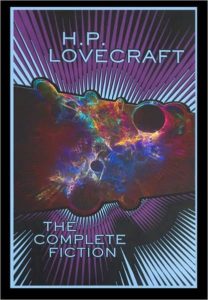 At Barnes & Noble you can find a plethora of leatherbound classics with gilded pages that, in many cases, contain an author’s entire works. In this case, we’re talking the one and only H.P. Lovecraft, master of atmospheric horror and the creator of the mythic Cthulhu. With enough fiction to fill each day in October with a few stories, it’s time to get your daily dose of Lovecraft. Join me as I read this tome from cover to cover – and hopefully maintain my sanity.
At Barnes & Noble you can find a plethora of leatherbound classics with gilded pages that, in many cases, contain an author’s entire works. In this case, we’re talking the one and only H.P. Lovecraft, master of atmospheric horror and the creator of the mythic Cthulhu. With enough fiction to fill each day in October with a few stories, it’s time to get your daily dose of Lovecraft. Join me as I read this tome from cover to cover – and hopefully maintain my sanity.
Please note that we here at Speculative Chic are very aware of the problematic issues regarding H.P. Lovecraft’s mindset, which included xenophobia and racism. With these pieces I intend to focus solely on the content of the stories themselves since I have read only 1-2 stories in the past and will be looking at them through my own personal lens rather than delving into any particular meanings Lovecraft may have meant. Such issues of racism and xenophobia will only be addressed if they appear in the story.
Now let’s get weird.
“Hope had departed.”
(The Beast in the Cave, pg.1)
Written in 1904, Lovecraft wasn’t even 15 when he wrote this particular story. In some ways you can tell, as the end has that surprise “twist” that so many of us young writers try to throw at readers despite being perhaps not so imaginative. Although during those times, I can’t exactly claim I know what would or would not be considered a well-established trope. The premise here is simple – our nameless protagonist (the story is written in first person) has strayed from his tour group in Mammoth Cave and wanders lost amidst the vastness of the place. The inevitable happens – his torch goes out – and after attempting to shout for help, realizes footsteps are approaching. Yet they do not sound human.
I wondered, as I have read a scant few of Lovecraft’s stories before, what this monstrosity might be, only to discover it is naught but a man. Well, sort of. Here you do get a taste of what’s to come with Lovecraft’s writing; descriptive, but not overbearing, plenty of the character’s personal musings, and a good visual grip on the monster he wants you to see. Is it scary? If being lost in caves and having unknown things shuffling towards you creeps you out, then it has the potential of being unnerving. However, the capitalization at the end puts me more in mind of kids telling scary stories over a campfire and shouting at the end to make their listeners jump. Typographical decisions aside, it’s a neat, quick little introduction into what’s to come that is indeed quite promising.
“The Alchemist”
Written much later in 1908, this story’s protagonist has a curse upon his family. We’re given a rather large backstory for such a short time, but it’s concise delivery is well done. The protagonist (again, first person), lives in what was once a magnificent estate, now crumbling as those that once dwelled there have all died off. For many years it is merely the main character and an old servant. As the boy grows into a man, he eventually learns that those in his family are destined to die at the age of 32 due to a now 600-year old curse. The servant dies and the young man is now on his own, wandering the decrepit estate and trying to figure out how not to die. One day he discovers a door that leads – where else? – down into the depths of the castle. Behind an old door he finds a terrifying creature of a man.
The story here has two twists – who the man is and the very nature of the curse. I’m can’t say for sure yet, but it seems Lovecraft either chose dark, damp, stone-enclosed places on purpose in which our imaginations can run amok, or if he was drawn to those sorts of locations because they both fascinated him and scared him (much in the way that I feel about certain post-apocalyptic settings). And what is it they say about horror? Write what scares you. The same could be said about the two beings encountered in both this story and the previous one. From bone-white skin to claw-like hands to pitch-black eyes (whites and irises optional), the only difference being that one is still, for lack of a better term, functional.
Again we have the all-caps twist announcement, but I did appreciate the nature of the curse. I went from thinking, “Okay, magic I guess,” to “Wow, not magic, and that’s actually way more impressive.” Far less scary than the previous story, but still an enjoyable late night story snack.
Featured image © Nicole Taft

No Comments